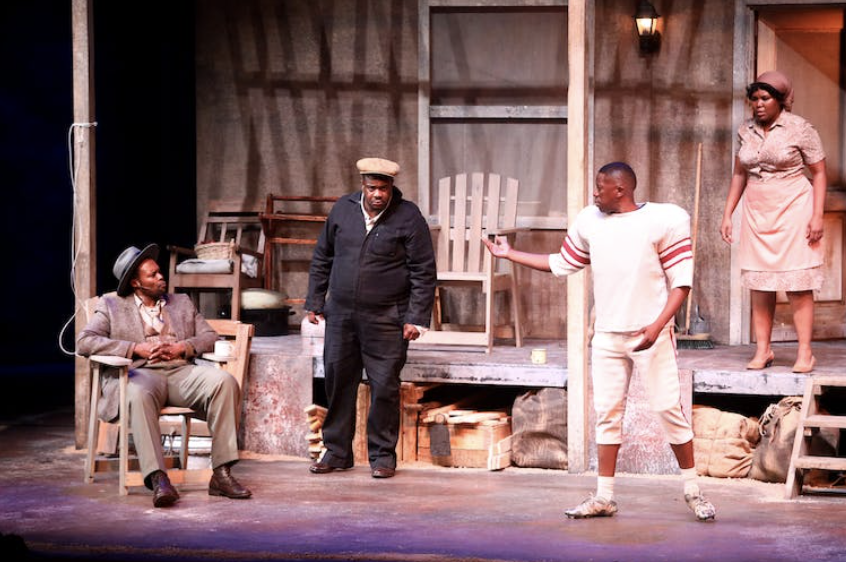ARTS, STYLE & ENTERTAINMENT
This is YOUR lifestyle gallery – of what is new and what is happening in the U.S. And the Black World, not excluding Africa. For this section if you have any news we should know about – let us know at: [email protected]
The Play ‘Fences’ A Powerful Depiction of the Struggles of Black Life In America… and South Africa

Fences on stage in Johannesburg. Fences/Joburg Theatre/JT Marketing
By Merle Williams
Fences, a creative examination of a black family’s experience, is one of the most frequently performed plays in the US. It was first developed in 1983 by celebrated African American dramatist August Wilson, becoming a successful Broadway production in 1987.
Wilson was born in 1945 in a poor district of Pittsburgh; he died in 2005. A pathbreaking force in shaping African American drama, he was awarded the Pulitzer Prize for both Fences (1987) and The Piano Lesson (1990). Fences became an acclaimed Hollywood film in 2016.
Wilson’s work continues to compel audiences not simply through its imaginative power, but because its rounded insider’s perspective makes ordinary African Americans sympathetically visible as they love and struggle.
These are lives otherwise overlooked by an indifferent white community.
Interest in the play now extends far beyond the US. The current run of Fences in Johannesburg, South Africa, will vividly bring to mind the destructive after-effects of apartheid on black life. Beyond this, Wilson’s drama aims to touch deep human responses in all of us.
The backdrop
In a 1996 speech, Wilson argues that he stands on the ground “pioneered by the Greek dramatists” and Shakespeare – but also on the ground broken by his grandfather and other committed activists for black identity, independence and culture. Despite society’s denial of Black rights, he wants passionately to affirm “the value of (his) being” as a person. At the same time, he regards race as “the largest, most important and most identifiable part of our personality … the one to which others in the world of men most respond”.
What the play’s about
Fences portrays the characteristic rhythms and aspirations of a family in Wilson’s childhood Hill District of Pittsburgh: the stark tensions between father and son, the constant haunting of a bitter past – and the fragile hope for self-actualization infused by forgiveness.
Its meaning in South Africa
Fences probably assumes a range of charged resonances for South African audiences. Aptly, the first professionally staged play that August Wilson watched was South African playwright Athol Fugard’s Sizwe Bansi Is Dead, which exposes the humiliating injustice of apartheid South Africa’s pass laws, a system that rigidly controlled the movements of black people and their right to work.
The parallels between apartheid as an oppressive system of white minority rule and the US before civil rights are striking. Troy Maxson’s ample personality strains against such a structure of shrunken opportunities for his roiling energy. So, his frustration turns back on itself, poisoning his manhood and steadily damaging his family relationships.
In post-apartheid South Africa, the perspective should, of course, be different. The country’s constitution explicitly outlaws racial discrimination, while the US – in theory, at least – has progressed beyond overtly discriminatory practices. Nonetheless, deeply seared memories and the consequent wounding remain.
The same principle would apply to the persisting traumatic inheritances of apartheid. Many communities in South Africa continue feeling the remorseless grip of the past in their endurance of disadvantage and alienation. They are still on the wrong side of the fence, while canny (or corrupt) others have expediently fixed the boundaries of privilege.
Although Wilson insists on representing the concrete elements of African American history, he equally embraces the universality of theatre as a medium for distilling human concerns:
Love, honor, duty, betrayal belong and pertain to every culture and every race.
In its closing scene, Fences reaches towards healing through forgiveness and a glimmering hope for a freer future. These impulses will speak to many post-apartheid South Africans too.
Newsletter
Subscribe to our bi-weekly newsletter and be the first to Receive New Updates.
Your comments, ideas, and thoughts matter.
Drop us a line: